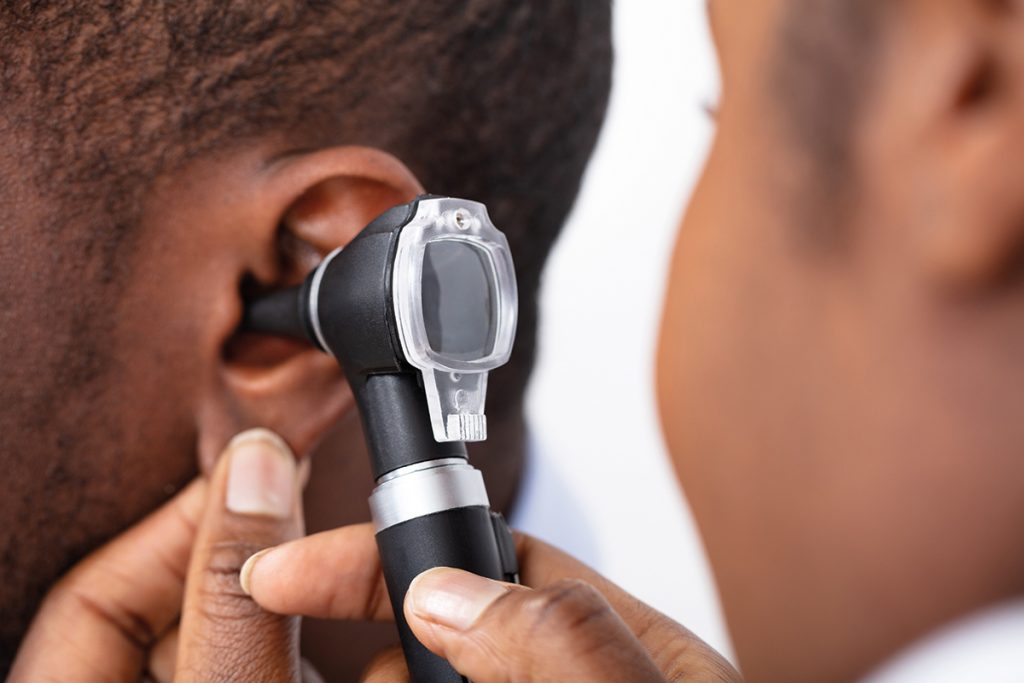Long Covid: tinnitus, hearing loss and anosmia

Continuing our series, Dr Steve Brown outlines some key ear, nose and throat symptoms associated with long Covid and how to manage them
ENT manifestations of acute Covid-19 include anosmia (reported in 20-70% of cases), rhinorrhoea or nasal congestion (6%) and sore throat (11%).1,2
Smell or taste dysfunction may occur in up to 75% of patients according to some studies, while 25% of patients with acute Covid infection report anosmia is their first, and sometimes only, symptom. Some patients report hyposmia (reduced sense of smell), or cacosmia (distorted smell perception).
In addition, 7-15% of adults in some studies of acute Covid symptoms report audiovestibular symptoms, either tinnitus or hearing loss or both. Some patients with acute Covid report vertigo.
NICE defines long Covid as signs or symptoms that develop with acute Covid infection, continue for longer than 12 weeks and are not explained by an alternative diagnosis.3 It lists loss of taste or smell, tinnitus and earache as common long Covid ENT symptoms, along with sore throat and dizziness.
Over 50% of patients in one survey reported anosmia continuing after 12 weeks.4 Although tinnitus and hearing loss are also reported to be part of long Covid, the incidence is not known.5
Management of tinnitus
Stress is linked to tinnitus, so financial worries, bereavement, depression and isolation, all of which have increased during the pandemic, are factors that have to be taken into account. A holistic approach to assessment and management is needed. An audiogram can be helpful, as tinnitus and hearing loss are often co-existent.
The prognosis for long Covid-related tinnitus is not clear. Often, explanation and reassurance are enough. Treatment of coexisting depression or anxiety is often appropriate, and cognitive behavioural therapy can help. Night-time symptoms can be treated by distraction, using quiet music or soothing sounds. Occasionally low-dose amitriptyline can be used to help sleep.
Managing hearing loss
An audiogram should be performed to assess the level of hearing loss. In my experience it is not uncommon for patients recovering from Covid to feel their hearing loss is more severe than it actually is. It is important to exclude ear wax and middle ear effusion as causes of acute hearing loss. Seek advice from secondary care if rapid access to syringing or microsuction is unavailable. Middle ear effusion should be excluded by tympanometry, as this is much more accurate than clinical examination alone.
Reassurance is helpful if the audiogram is within acceptable limits. A follow-up audiogram can be useful to track the trend of hearing loss. Patients with acute, severe hearing loss that is otherwise unexplained require referral; do not assume it is Covid related as other causes such as an acute vascular event must be excluded. Again, more research is needed to understand outcomes.3
Persistent anosmia
It is thought that anosmia due to Covid has a better chance of spontaneous recovery than anosmia caused by other viruses. This is because Covid attacks cells supporting the olfactory bulb, rather than the olfactory bulb itself, which regenerate better. This information may help reassure patients.
Nonetheless, anosmia, hyposmia or cacosmia can persist for several months post-Covid-19 infection. Patients may suffer from reduced appetite and weight loss. Gas leaks may go undetected, and sufferers may eat spoiled food. Some patients with anosmia may become depressed or anxious.
Acute nasal congestion associated with anosmia should be treated with topical decongestants or saline irrigation; topical nasal steroids may be helpful even if there is no congestion. Avoid systemic steroids as the immunosuppression may provoke other infections.
Advise patients in whom symptoms persist after 12 weeks to try smell training with essential oils including rose, eucalyptus, clove and lemon. Support can be found from charities such as Fifth Sense or AbScent. Patients should do smell training twice a day, as follows:
- Place a few drops of each item into a separate bowl or jar.
- Inhale vapours gently and slowly.
- Repeat for 20–30 seconds.
- Move on to the next smell and repeat.Record experience and any changes.
- If the patient reports no improvement after six months, refer to ENT.
Red flags
Look out for serious pathology that may be misattributed to long Covid. Refer urgently to ENT services if there is:
- Acute unilateral hearing loss in the absence of wax or otitis media or a middle ear effusion.
- Unilateral nasal blockage – look for tumours by nasendoscopy and/or CT scan
- Weight loss – detailed investigations may be needed
Dr Steve Brown is a GPSI in ENT and practises in Beaconsfield, Buckinghamshire
References
- Carillo-Larco R and Altez-Fernandez C. Anosmia and dysgeusia in Covid-19: A systematic review. Wellcome Open Res 2020;5:94
- El Anwar M, Elzayat S, Fouyat Y. ENT manifestation in Covid-19 patients. Auris Nasus Larynx 2020;47:559-64
- NICE. Covid-19 rapid guideline: managing the long-term effects of Covid-19, 2020. NG188
- RCGP. Managing smell and taste disorders in primary care. Updated May 2021
- Munro K. Coronavirus: why we’re investigating the long term impact on hearing. The Conversation 2020
Pulse July survey
Take our July 2025 survey to potentially win £1.000 worth of tokens

Visit Pulse Reference for details on 140 symptoms, including easily searchable symptoms and categories, offering you a free platform to check symptoms and receive potential diagnoses during consultations.
Related Articles
READERS' COMMENTS [3]
Please note, only GPs are permitted to add comments to articles











Experience intimate moments like never before.”
Hi, Neat post. There’s an issue together with your web site in internet explorer, may test this텶E still is the marketplace chief and a good component of people will pass over your fantastic writing due to this problem.
Hey there, You have done a fantastic job. I will certainly digg it and personally recommend to my friends. I’m confident they’ll be benefited from this site.